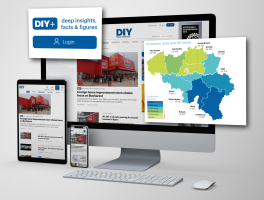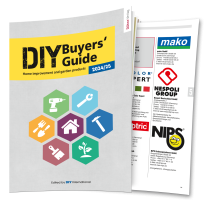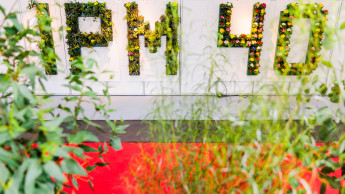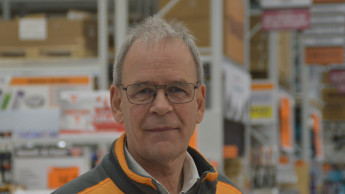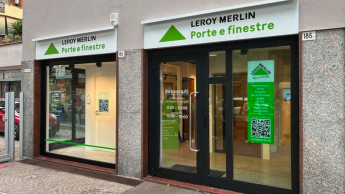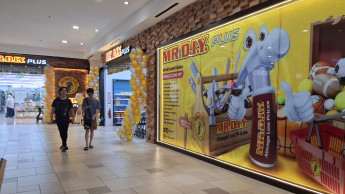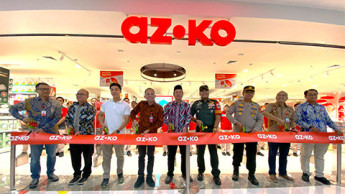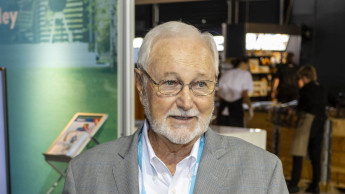The year 2002 was in retrospect a poor one for the DIY sector in Germany. Nevertheless, despite a decline in space productivity, the DIY multiples saw to continuing growth in retail area
The 30 best-performing German DIY companies, which come under consideration in the publishing house of Dähne’s annual “diy Statistik” statistical supplement, opened 107 stores both at home and abroad, thereby expanding their combined retail area by around 500 000 m2. The total retail area in Germany, where 77 new outlets were inaugurated, rose by around 360 000 m2 in spite of a great number of store closures. Despite these new openings, there were 39 fewer DIY superstores and builders’ merchants at the end of 2002 than one year previously (for a total in December 2002 of 4 093).
Continuing floorspace growth
In the year 2002, 69.2 per cent of all new openings had a retail area in excess of 5 000 m2 (70.6 per cent in the previous year). Of this group, 29 per cent were larger than 10 000 m2 (34.1 per cent in the previous year). The proportion of outlets between 2 500 and 5 000 m2 in size has continued to decline, coming to 9.3 per cent in 2002. This compares with a figure of 10.6 per cent in 2001 and as much as 15.1 per cent in 2000. The development of the category of stores below 1 000 m2, which accounted for a share of 7.5 per cent, was also in decline (compared with 10.6 per cent in the previous year).
The multiples were the clear winners in terms of new openings in 2002, when 51.6 per cent were for their account (compared with the previous year’s 49.4 per cent). The cooperative groups also increased their 14.1 per cent share in 2001 to 14.7 per cent in 2002. By contrast, the franchise groups saw their share fall by 2.8 percentage points to 33.7 per cent.
Winners and losers
Top of the expansion stakes was EMV-Profi, which owes its growth of 13.6 per cent to the incorporation of a number of Raiffeisenmarkt outlets into its business. Second-placed Hornbach grew by its own efforts by more than eleven per cent through opening ten large-format DIY and garden stores both at home and abroad. Occupying third place was BayWa, which managed to notch up over nine per cent growth through a merger with WLZ. Certain companies saw no change to their number of stores after the addition or subtraction of outlets. These include Baustoff Verbund Süd, Coop, Hellweg, Interpares-Mobau, Kaes, Knauber, Nordhessischer Baustoffmarkt, Ratio, Rheika-Delta, Stabilo and Wal-Mart. Percentage growth was weak though still welcome for Max Bahr, Bauhaus, Distributa, Marktkauf/Dixi and OBI. Both Hagebau and the Praktiker group numbered twelve stores fewer than a year previously. Smaller losses on balance were recorded by EGN, Krämer, NBB/Bauspezi, Nowebau, Rewe (Toom) and ZEUS. Last year the battle for market share left behind fewer obvious traces than expected. Nonetheless, signals were apparent in the way Interpares-Mobau and Interbaustoff moved closer together, and in Hagebau’s involvement with ZEUS in the retail sector. What is more, on the commercial side, efforts are ever more frequently being made to thin out the number of suppliers and to increase European cooperation, the effects of which are then felt by the industrial side.
Activities abroad
At the same time, this expansion is leading to both western and eastern Europe and beyond: German companies completed 30 stores abroad in 2002 (compared with 31 in 2001). Many companies, and in particular those that already work abroad, want to further increase their international portfolio. Bauhaus, for instance, whose 54 international stores generate a 35 per cent share of sales, intends to open at least eight more outlets outside Germany. Globus has concentrated on the Czech Republic and wants to grow still further there. So far Hornbach is represented by 20 stores in four countries, which contribute 25 per cent to its sales total. This share of turnover is to be further increased in future through expansion, especially in the Netherlands and Austria, and through its planned market entry in Sweden. Marktkauf has just opened the first DIY superstore in Moscow. Market entry in Austria now takes top priority for NBB/Bauspezi, though the group also intends to grow in the Czech Republic as well. Last year the company withdrew from Spain, where it had one outlet.
The 125 international OBI stores contributed 1.3 bn euro, or a 27 per cent share, to the company’s total sales, and at least 13 more stores are to follow in 2003. Praktiker, now with a 52-store presence abroad, sees opportunities in countries such as Bulgaria and Russia, in addition to possibilities for further expansion in markets such as Poland, Romania, Turkey and Hungary, where it is already represented.
Declining space productivity
The 30 best-performing DIY companies achieved gross sales of 22.40 bn euro in 2002 and had a combined retail area of 14.7 mio m2. This means that space productivity came to 1 523 euro per m2. This figure has fallen continuously over recent years: the average generated in 1995, for example, was as high as 1 841 euro per m2. The weighting of retail area that has meanwhile been introduced should actually have produced the opposite result. One explanation could be that the newer, large-format and mega-format DIY stores generate lower space productivity than smaller outlets.
Garden segment growing
Tiles were particularly hard hit by the sales decline, recording a result of –5.8 per cent. Tools and machines at –5.4 per cent and plumbing/heating at –5.1 per cent were also badly affected. By contrast, the “other products” category (including items that are not specifically DIY-relevant) showed an increase of 9 per cent, paint and accessories were up by 3.8 per cent, and products in the garden/camping/leisure category recorded a plus of 3 per cent. This last category accounts for approximately 22 per cent of the total sales of the German DIY superstore sector, according to the DIY panel of the GfK.
"The Germans top 15 by gross sales in 2002"
(.pdf-download)
"The top 15 by retail areas"
(.pdf-download)
"New stores opened in 2002 by type of business"
(.pdf-download)
"German DIY store groups abroad"
(.pdf-download)
"New stores opened in 2002 by retail area"
(.pdf-download)

 Menü
Menü





